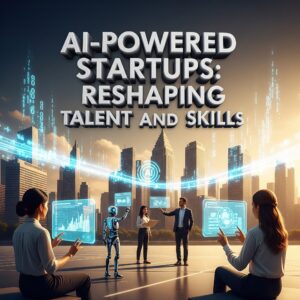The Founder’s Perspective: Navigating the AI-Driven Talent Landscape
As a founder, building a team capable of harnessing AI is no longer a competitive advantage—it’s becoming a fundamental requirement for survival and growth. This necessitates a shift in how you approach talent acquisition, team structure, and internal skill development.
Identifying the Skills of the Future: Beyond the Traditional Tech Stack
The skillsets needed in early-stage startups are evolving rapidly. While technical expertise in software development and product management remains crucial, proficiency in AI-related areas is increasingly vital. This includes:
- AI Literacy: A basic understanding of AI concepts, including machine learning, natural language processing, and computer vision. This isn’t just for engineers; marketing, sales, and customer support teams need to understand how AI can improve their workflows. Consider offering internal training sessions or workshops to enhance your team’s AI literacy. Resources like Coursera and edX offer excellent introductory courses.
 Data Analysis and Interpretation: AI thrives on data. The ability to collect, clean, analyze, and interpret data to derive actionable insights is critical. This requires skills in statistical analysis, data visualization, and data storytelling. Tools like Tableau and Power BI are becoming essential for data-driven decision-making.
Data Analysis and Interpretation: AI thrives on data. The ability to collect, clean, analyze, and interpret data to derive actionable insights is critical. This requires skills in statistical analysis, data visualization, and data storytelling. Tools like Tableau and Power BI are becoming essential for data-driven decision-making.- Prompt Engineering: With the rise of Large Language Models (LLMs), the skill of crafting effective prompts to guide AI models is becoming increasingly important. This requires a blend of technical understanding and creative thinking.
- AI Ethics and Governance: As AI becomes more integrated into business processes, ethical considerations and responsible AI governance become paramount. Startups need individuals who can ensure AI systems are used fairly, transparently, and without bias. Consider implementing AI ethics guidelines, drawing inspiration from organizations like the Partnership on AI (https://www.partnershiponai.org/).
- Domain Expertise Paired with AI Acumen: Deep understanding of the industry and how AI can solve specific problems is crucial. This is more valuable than pure technical skill.
Adapting Talent Acquisition Strategies: Finding the Right AI Talent
Traditional recruitment methods may not be sufficient to attract and retain top AI talent. Founders need to adopt more proactive and targeted strategies:
- Targeted Recruiting: Focus on universities and institutions with strong AI programs. Attend AI-related conferences and meetups. Utilize specialized job boards and online communities frequented by AI professionals.
- Showcase Your AI Vision: Highlight your company’s commitment to AI innovation in your job postings and employer branding materials. Emphasize the opportunity to work on challenging and impactful AI projects.
- Assess AI Skills Effectively: Go beyond traditional technical interviews. Use practical coding challenges, case studies, and scenario-based questions to assess candidates’ AI skills and problem-solving abilities. Consider using platforms like HackerRank or Codility to evaluate technical skills objectively.
- Build an AI-Savvy Interview Team: Ensure your interview team includes individuals with a strong understanding of AI principles and applications. This will enable them to effectively assess candidates’ AI skills and cultural fit.
- Consider Nontraditional Hires: Look beyond traditional degrees. Bootcamps and online certifications can be valuable indicators of AI skills. Focus on demonstrable skills and project experience.
- Offer Competitive Compensation and Benefits: AI talent is in high demand. Offer competitive salaries, equity, and benefits to attract and retain top performers. Consider offering flexible work arrangements and opportunities for professional development.
Upskilling Your Existing Team: Cultivating an AI-Ready Workforce
Acquiring new talent is only part of the solution. Founders must also invest in upskilling their existing teams to thrive in an AI-driven environment:
- Internal Training Programs: Develop and implement internal training programs focused on AI literacy, data analysis, and relevant AI tools. Partner with external experts or online learning platforms to deliver high-quality training.
- Mentorship Programs: Pair experienced team members with AI experts to foster knowledge sharing and skill development.
- Encourage Experimentation: Create a culture of experimentation where employees are encouraged to explore AI tools and applications. Provide them with the resources and support they need to experiment and learn.
- Cross-Functional Collaboration: Encourage collaboration between technical and non-technical teams to foster a deeper understanding of AI’s capabilities and limitations.
- Promote Continuous Learning: Encourage employees to stay up-to-date on the latest AI trends and technologies through conferences, workshops, and online courses.
Restructuring Teams for AI Integration: Optimizing for Efficiency and Innovation
Integrating AI effectively may require restructuring teams to optimize for efficiency and innovation. This could involve creating dedicated AI teams, embedding AI specialists within existing teams, or adopting agile methodologies that facilitate rapid experimentation and iteration. The specific approach will depend on the company’s size, industry, and AI strategy.
For example, a fintech startup might create a dedicated “AI Innovation Team” responsible for exploring new AI applications in areas like fraud detection, risk management, and customer service. Alternatively, a marketing technology startup might embed AI specialists within its marketing and product teams to help them leverage AI to personalize customer experiences and optimize marketing campaigns.
The key is to create a structure that fosters collaboration, experimentation, and continuous learning, ensuring that AI is seamlessly integrated into all aspects of the business.
The Investor’s Perspective: Evaluating AI-Driven Startups
Investors are increasingly scrutinizing startups’ AI capabilities and talent pools. A company’s ability to effectively leverage AI is becoming a key factor in investment decisions.
Assessing AI Capabilities: Beyond the Hype
Investors need to look beyond the hype and assess a startup’s AI capabilities objectively. This requires a thorough understanding of the company’s AI strategy, technology, and team.
- Evaluate the AI Strategy: Does the company have a clear and well-defined AI strategy that aligns with its overall business objectives? Is the strategy realistic and achievable?
- Assess the Technology: Is the company’s AI technology cutting-edge and differentiated? Does it solve a real problem in a unique and effective way? Are they building proprietary models, or leveraging existing APIs?
- Analyze the Data: Does the company have access to high-quality data that is relevant to its AI applications? Is the data properly managed and secured? Is their data defensible?
- Scrutinize the Team: Does the company have a strong AI team with the necessary skills and experience? Are the team members passionate about AI and committed to innovation?
- Demand Proof of Concept: Ask for demonstrable results and use cases. How is the AI improving key metrics? What are the ROI figures?
The Importance of AI Talent: A Differentiator in a Competitive Market
A startup’s AI talent is often its most valuable asset. Investors need to carefully evaluate the company’s AI team, assessing their skills, experience, and track record.
- Look for Expertise: Does the team have expertise in relevant AI areas, such as machine learning, natural language processing, and computer vision?
- Assess Experience: Has the team successfully built and deployed AI solutions in the past?
- Evaluate Leadership: Does the company have strong AI leadership that can guide the team and drive innovation?
- Consider Diversity: Is the team diverse in terms of skills, backgrounds, and perspectives? A diverse team can bring fresh ideas and approaches to AI development.
Understanding the Risks and Challenges of AI Adoption
Investing in AI-driven startups comes with inherent risks and challenges. Investors need to be aware of these risks and carefully assess a company’s ability to mitigate them.
- Data Bias: AI models can be biased if they are trained on biased data. Investors need to ensure that companies are aware of data bias and are taking steps to mitigate it. Review their data sourcing and cleansing processes.
- Ethical Concerns: AI can raise ethical concerns, such as privacy, fairness, and accountability. Investors need to ensure that companies are using AI ethically and responsibly.
- Regulatory Compliance: AI is subject to increasing regulatory scrutiny. Investors need to ensure that companies are complying with all applicable regulations. Review their legal and compliance frameworks. The EU AI Act (https://artificialintelligenceact.eu/) is a good example of upcoming regulation.
- Model Explainability: The “black box” nature of some AI models can be a challenge. Investors should favor companies that prioritize explainable AI (XAI), where the reasoning behind decisions is transparent and understandable.
- Over-Reliance on AI: Startups should not become overly reliant on AI, neglecting human oversight and critical thinking. Investors should look for a balanced approach.
Valuation Considerations: Accounting for AI’s Impact
Valuation models for AI-driven startups need to account for the potential impact of AI on the company’s future growth and profitability. This may involve adjusting traditional valuation metrics to reflect the company’s AI capabilities and the potential for AI to disrupt its industry.
- Future Revenue Projections: Consider how AI could drive future revenue growth. Will AI enable the company to acquire more customers, increase customer lifetime value, or expand into new markets?
- Cost Savings: Assess how AI could reduce costs. Will AI automate tasks, improve efficiency, or reduce errors?
- Competitive Advantage: Evaluate how AI could create a sustainable competitive advantage. Will AI enable the company to offer unique products or services, improve customer experiences, or develop proprietary technology?
- Discount Rate: Adjust the discount rate to reflect the risks and uncertainties associated with AI adoption.
The Symbiotic Relationship: Founder and Investor Alignment in the AI Era
Ultimately, success in the AI-driven early-stage ecosystem hinges on alignment between founders and investors. Founders must clearly articulate their AI vision and strategy, while investors must be willing to provide the resources and support needed to achieve that vision. Open communication, transparency, and a shared understanding of the risks and opportunities associated with AI are essential for building a successful partnership.
For example, founders should be transparent about the limitations of their AI models and the potential for bias. Investors, in turn, should provide guidance on ethical AI practices and help the company navigate the evolving regulatory landscape. If a company is using AI tools to enhance customer service, investors could look for metrics such as customer satisfaction (CSAT) scores, Net Promoter Score (NPS), and customer retention rates to evaluate the effectiveness of the AI implementation.
By working together, founders and investors can unlock the full potential of AI and create a more innovative and prosperous future.
Conclusion: Embracing the AI Revolution
The adoption of AI tools is revolutionizing the early-stage startup ecosystem, presenting both opportunities and challenges for founders and investors. By understanding the skills of the future, adapting talent acquisition strategies, investing in upskilling, and carefully evaluating AI capabilities, both groups can thrive in this new landscape. The future of work in early-stage startups is inextricably linked to AI, and those who embrace this revolution will be best positioned for success. Founders who prioritize AI literacy within their teams, and investors who diligently assess AI capabilities will see returns far beyond their initial investments.


